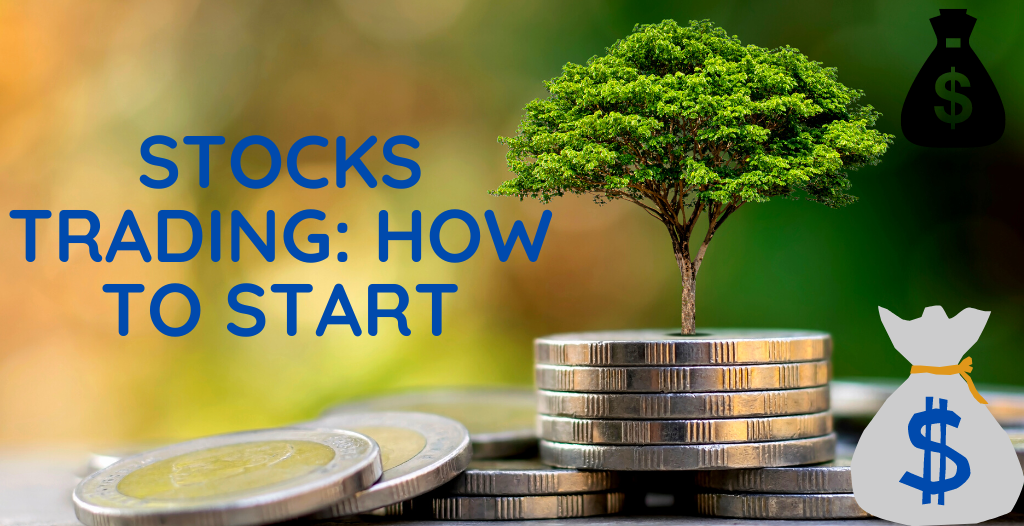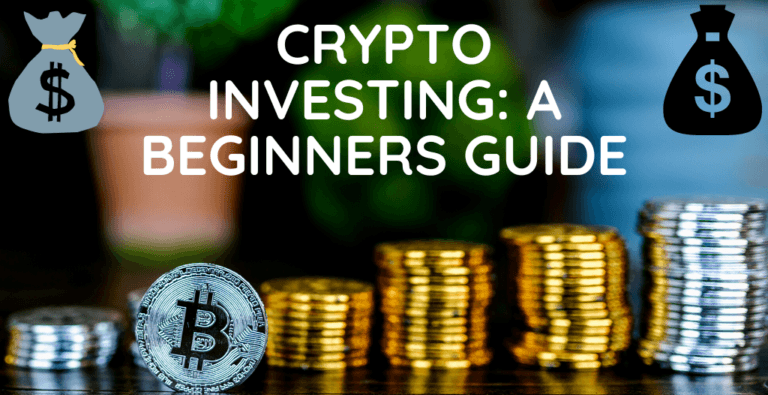How To Make Your First Investment So You Can Become A Millionaire
Are you ready to become a millionaire? One of the most important steps towards achieving financial freedom is making your first investment.
Investing can help your money grow and work for you, but it can also be intimidating if you’re new to the game. How do you know where to start, what assets to invest in, and how much risk to take on?
In this article, we’ll answer these questions and provide a guide to help you make your first investment. So, grab a pen and paper, and let’s get started on your path to becoming a millionaire with these three questions to ask before investing in stocks and crypto.
How involved do you want to be with your investments?
When you ask yourself how involved you want to be this is more of a time question and an interest question because you could either be a passive investor or an active investor. Passive investing requires little time and effort from you, whereas active investing requires more effort and research.
If you don’t have much time to invest or don’t want to worry about researching companies, passive investing may be the right choice for you. As a passive investor, you can set up an automated investment plan that will invest a portion of your money automatically, without you having to worry about it because once you’ve set it up, you can sit back and watch your investments grow.
On the other hand, if you’re interested in investing and have the time to research and monitor your investments, active investing may be the right choice for you. As an active investor, you will look for individual investments, such as stocks or real estate, and spend time researching and monitoring them.
What assets do you want to invest in?
Now, what do you want to actually put your money in? Is it the stock market or are you going to be lending your money, what do you want to actually invest your money in?
There are different types of assets you can invest in, including stocks, real estate, businesses, cryptocurrency, and more. Each type of asset has its own set of risks and rewards, so it’s important to do your research before investing.
If you’re a passive investor, some of the most accessible investments for you are stock market investments and real estate funds. You can invest in a fund that gives you exposure to a lot of companies or real estate without having to do any research or monitoring.
If you’re an active investor, you can invest in individual stocks, real estate, businesses, and other assets. This requires more research and monitoring on your part, but it also has the potential for higher returns.
How do you want to get paid?
There are two main ways to get paid when investing: cash flow and capital gains. Cash flow means that you’re getting paid without selling your assets, whereas capital gains mean that you’re hoping to sell your assets for a profit in the future.
If you’re a passive investor, you may be more interested in cash flow. You can invest in assets that generate a regular income, such as dividend-paying stocks or real estate that produces rental income.
If you’re an active investor, you may be more interested in capital gains. You can invest in assets that have the potential to increase in value over time, such as growth stocks or real estate that is expected to appreciate.
Assessing Your Financial Situation
Before making any investment, it’s important to evaluate your financial situation and determine your risk tolerance.
Assessing your income, expenses, debts, and savings can help you determine how much you can afford to invest and how much risk you can tolerate.
Choosing an Investment Platform or Brokerage
Brokerage firms are financial institutions that facilitate the buying and selling of securities such as stocks, bonds, and mutual funds. So, once you have assessed your financial situation, determined your risk tolerance, you need to have a brokerage account or investment platform.
Webull:
Webull is a commission-free online brokerage firm that offers a variety of investment options, including stocks, ETFs, options, and cryptocurrency. They offer a paper trading feature that allows users to practice trading with virtual money before investing real money.
They charge no fees for stock, ETF, or options trading, and their margin rates are also low. However, they do charge fees for certain services, such as wire transfers and short selling.
Robinhood:
Robinhood is a popular brokerage firm that offers a range of investment products, including stocks, ETFs, options, and cryptocurrency. They offer $0 commission on online US stock, ETF, and option trades, with no account minimums or maintenance fees.
However, they do charge fees for margin trading and for certain types of trades in which they route orders to market makers. There’s also a $75 fee for transferring an account to another brokerage firm.
Vanguard:
Vanguard is another large brokerage firm known for its low fees and long-term investing options. Vanguard is popular for its low expense ratios on its mutual funds and ETFs, and they offer commission-free trading on Vanguard ETFs.
Charles Schwab:
Charles Schwab is a discount broker that offers a wide range of investment options, including stocks, bonds, ETFs, mutual funds, and futures. They also offer commission-free trading on Schwab ETFs and have a no-transaction-fee mutual fund program.
Merrill Edge:
Merrill Edge is the online brokerage arm of Bank of America Merrill Lynch. They offer a wide range of investment options, including stocks, bonds, ETFs, mutual funds, and more.
Fidelity:
Fidelity Investments is one of the largest brokerage firms and offers a wide range of investment options, including stocks, bonds, ETFs, mutual funds, and they offer over 3,700 no-transaction-fee mutual funds.
TD Ameritrade:
TD Ameritrade is a popular brokerage firm that offers a range of investment products, including stocks, bonds, mutual funds, ETFs, options, and more. They offer $0 commission on online US stock, ETF, and option trades. Mutual fund fees vary by fund, but TD Ameritrade offers many no-transaction-fee funds.
NOTE: Charles Schwab has acquired TD Ameritrade in November 2019 and the transition of its accounts to Charles Schwab was finalized on September 2, 2023.
E-TRADE:
ETRADE offers a range of investment options, including stocks, bonds, ETFs, mutual funds, and more. The firm charges no commission on stock trades and offers no-fee ETFs.
It’s worth noting that while these firms offer no commissions on certain trades, they may still charge other fees, such as account maintenance fees, transfer fees, or regulatory fees. Additionally, while these firms offer a range of investment options, some may offer more or less investment choices depending on the type of account and investment strategy.
It’s important to carefully research each brokerage firm to understand the full range of fees and investment offerings before making a decision on which one to use.
Find additional stock trading app on our dedicated page for crypto and stock exchanges here.
Diversification and Risk in the Stock Market

Diversification means investing in a variety of assets to spread out your risk, so that if one asset performs poorly, the others may perform well and help offset the losses.
Investing in a diversified portfolio can help you reduce risk and maximize returns over the long term. This is because different assets perform differently depending on market conditions, economic trends, and other factors.
By spreading your money across different assets, you can reduce the impact of any single asset’s performance on your overall portfolio.
However, it’s important to note that diversification doesn’t guarantee profit or protect against loss. Even a diversified portfolio can experience losses during a market downturn or economic recession.
Also, chasing hot stocks, timing the market, and investing without a clear plan can all be detrimental to your investment portfolio. Stay informed and continue to monitor your investments to make adjustments as needed.
The Bottom Line
Investing can be a great way to grow your wealth and achieve financial freedom, but it’s important to understand the different investment options available and consider your own goals, time horizon, and risk tolerance. Whether you choose to be a passive or active investor, it’s important to do your research and understand the assets you’re investing in. Diversification can help reduce risk and maximize returns over the long term, but it’s not a guarantee of success.
Remember to stay informed, monitor your investments, and make adjustments as needed to stay on track towards your financial goals. With the right mindset and approach, anyone can start investing and work towards becoming a millionaire over time.
Also, Follow me on Social media
Facebook Profile || YouTube Channel
DISCLAIMER: I'm not a financial advisor. Nothing I say in my videos or on this page is a suggestion for you to buy, to sell, or hold a stock or cryptocurrency, nor do we believe in overnight success. We believe in hard work, integrity and developing your skills if you want to earn more financially. As stipulated by law, we cannot and do not make any guarantees about your ability to get results or earn any money with our courses, events, affiliate program, any business opportunity promoted on this page or our free video trainings. The average person who buys any “how to” information gets little to no results. The references on this page are real and documented but are used here strictly for example purposes only. Your results will vary and depend on many factors, including but not limited to your background, experience, and work ethic. All business entails risk as well as massive and consistent effort and action. If you are not willing to accept that, please feel free to exit this page immediately. May you be rich! - Videgla M.







